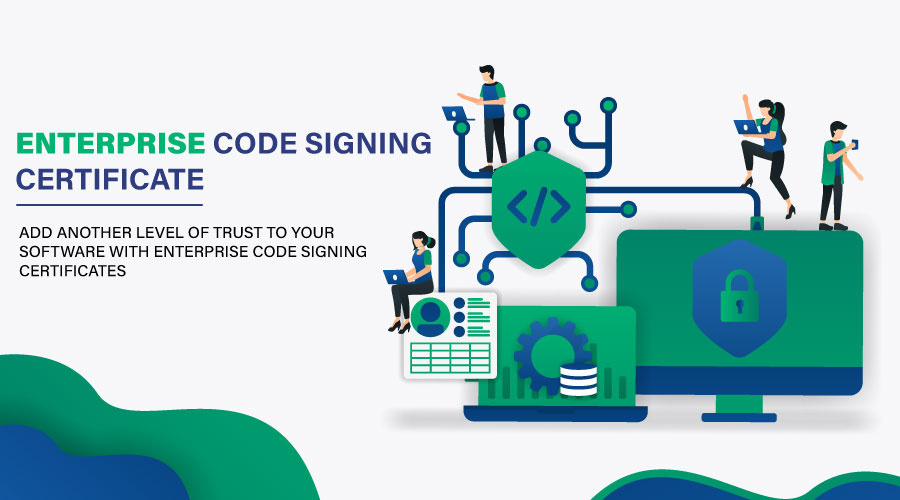What is Enterprise Code Signing Certificate [A Detailed Guide]

Each business today requires user data to provide a better customer experience. The widespread use of data has triggered cyberattacks so much that they have become a part of software too.
As per stats, there were 121 ransomware attacks in the first half of 2021. And these attacks are primarily in the form of fake software. This is where code signing come into the picture.
Code signing is a process where an X.509 certificate is used to sign a piece of code or software. The core motive behind code signing is to ensure the users that your software is legit, is from a trusted entity and does not contain malware.
There are various elements in a code signing, such as the signature, the company’s name, and a timestamp.
If you are a business, a code signing certificate is what you need to use. Now, what is it, and how does it work? Everything will be explored in absolute detail in the article below!
What is an Enterprise Code Signing Certificate?
There are various types of code signing certificates that will be discussed later. For now, let’s see what an EV code signing certificate is.
An EV code signing certificate is a certificate that is issued after a stringent vetting process. Unlike Individual Code Signing Certificate or organization validation (OV) code signing certificates, the EV certificate is not issued quickly.
There are a lot of technicalities involved such as
- The CA (certificate authority) thoroughly verifies the identity of software publisher
- The hardware security requirements are checked
- The entity that requests the certificate is checked to see if it is legitimate and is in operation
After these aspects are verified to the core and the CA is satisfied with all the provided information, the EV code signing certificate is issued to the entity.
Note: There is a distinguishable difference between the individual and EV code signing certificates. You will get the private key physically mailed to you in the case of the EV code signing certificate.
Hence, no one except you on the web can make authorized changes to the code if you have an EV code signing certificate.
Recently, the CA/B forum has made changes to this. As a part of it, in near future OV Code signing certificates will also require private keys to be stored in hardware tokens.
Pros of EV Code Signing Certificate
Here are some benefits that rank EV certificates above all:
Two-factor Authentication:
As the private key is stored locally on a USB device, the EV certificate provides two-factor authentication. How? Whenever you sign your code or executable file (.exe file) using the certificate, you will require the private key to ensure that you are not an unauthorized person trying to sign the software.
Timestamping:
The EV code signing certificate allows you to timestamp the software or code using the private key. It keeps your software alive after the certificate expires.
Cost-effective:
With an Comodo EV code signing certificate, you can easily get instant trust from Microsoft SmartScreen. Hence, preventing any kind of pesky warnings for the users. As your software gets easily installed, you can make more money while covering the cost of the certificate.
Microsoft SmartScreen Reputation:
This is somehow related to the previous point where once your EV certificate is issued, you attain a reputation in the eyes of Microsoft SmartScreen. Your software will not create unnecessary pop-ups and will help gain users’ trust.
What is Microsoft SmartScreen Filter?
If, in any case, your Windows PC is showing you the unknown publisher security warning error, it is due to the Microsoft SmartScreen filter. It is an in-built tool by Microsoft that verifies the identity of the software publisher and shows a warning in case it’s not verified. Moreover, it also provides the necessary information about the software.
If you are a new software developer, Microsoft may flag your software even if you have code-signed it. It is because Microsoft has some technicalities that they check in the software.
Here are some of them:
- First, Microsoft SmartScreen checks the list of software, websites, and programs that are marked as malicious. If the filter finds the software in that list, it will raise a warning and block it.
- Secondly, Microsoft SmartScreen scans the list of popular downloads. The same warning is raised again if the software is not on the list.
Why Should You Care ?
You need to generate code signing certificates. Once it is generated, you don’t have to worry about anything. But what if you don’t sign the code using the certificate?
If you don’t sign the code with a genuine certificate, it can lead to various issues, such as
- Warnings: When you install unsigned software, it will warn you that the publisher is unknown. This directly means that the software might not be good for your system.
- Content Integrity: If the code or the executable file of the software is not signed, it means the code is not safe. Moreover, it might also be tampered with. Hence, the absence of a valid certificate declares poor content integrity.
Final Words
An enterprise code signing is one of the best ways to ensure that your produced software does not get rejected by any machine, user, or browser worldwide. It establishes trust with your customers and also guarantees data security and content quality.
Yes, it may seem a bit costly initially, but once added to your code or .exe file, it will surely be worth it in the long run.
To keep your software legit, you can buy enterprise code signing certificates of various reputed names such as DigiCert, Certera, Comodo and Sectigo.

